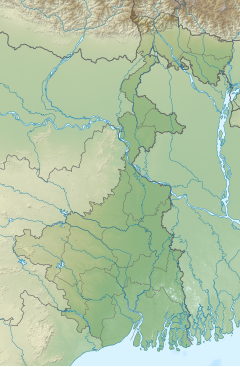Kapil Muni Temple
| Kapil Muni Temple | |
|---|---|
 | |
| Religion | |
| Affiliation | Hinduism |
| District | South 24 Parganas |
| Deity | Ganga, Kapil Muni, King of the Sea |
| Festivals | Gangasagar Mela |
| Location | |
| Location | Gangasagar |
| State | West Bengal |
| Country | India |
| Geographic coordinates | 21°38′12″N 88°04′24″E / 21.6365357°N 88.0733355°E |
| Architecture | |
| Creator | (Many reconstructions) |
| Completed | 1974 (present structure) |
Kapil Muni Temple or Kapil Muni Mandir (Bengali: কপিল মুনি মন্দির) is a Hindu temple located on the Gangasagar in the Indian state of West Bengal.[1] It is one of the holiest pilgrimage sites for Hindus and it is believed that Kapil Muni did Tapas here.
History
[edit]Ancient temples
[edit]Ancient temples were temporarily built temples. According to legend, the first "Kapil Muni Temple" was built by Queen Satyabhama in 430 AD.[2] The last temporary temple was built with bamboo. The bamboo temple was destroyed in the late 50s or early 60s. The first brick-built temple was built in 1961 for Rs 20,000, and the roof of the temple was made of asbestos. The former Chief Minister Bidhan Chandra Roy contributed Rs 11,000 to the construction of the temple. The construction of the temple was done by "S Chakraborty & Co." The temple was smaller in size than the present temple.[3]
New temple: 1974–present
[edit]The new temple was built in 1974.[3] As the temple and temple premises are on the banks of the Ganges River and the Bay of Bengal, sea and river water enters the temple and temple premises occasionally during High tide or cyclonic storms. A strong tropical cyclone named Yaas formed in the Bay of Bengal in late May 2021. Due to the impact of this storm, tidal water entered Kapil Muni's Ashram and temple.[4]
References
[edit]- ^ "Kapil Muni Ashram - Mythological Significance". www.gangasagar.in. Retrieved 30 March 2023.
- ^ Halder, Mohan; Baksi, Shanto (January 2014). "Gangasagar Mela Pilgrimage and Development at the Sagar Island". Society for Socio-Economic and Ecological Development. Retrieved 15 January 2024.
- ^ a b Gautam Chakraborty (14 January 2018). "'সব তীর্থ বারবার গঙ্গাসাগর এক বার'". Anandabazar (in Bengali). Retrieved 30 March 2023.
- ^ "সাগরের কপিলমুণির আশ্রম চত্বরে একবুক জল, নিরাপদ আশ্রয়ের খোঁজে বাসিন্দারা". bangla.hindustantimes.com (in Bengali). Retrieved 30 March 2023.

